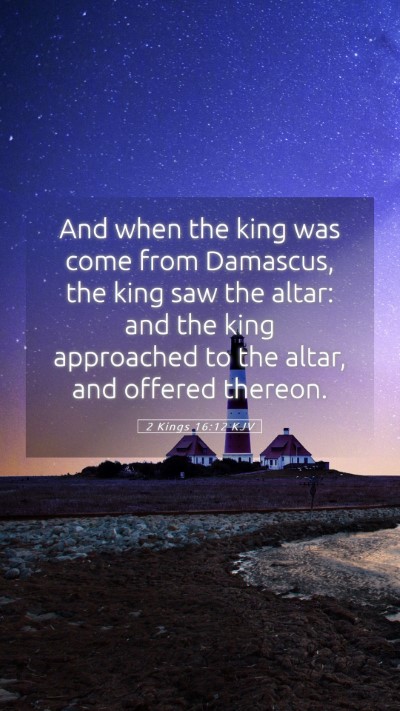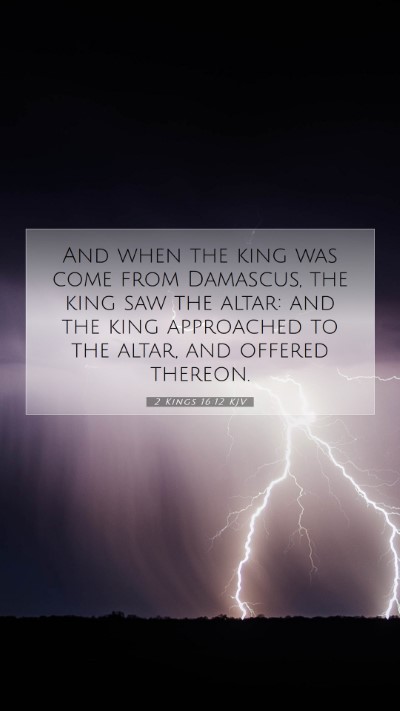Old Testament
Genesis Exodus Leviticus Numbers Deuteronomy Joshua Judges Ruth 1 Samuel 2 Samuel 1 Kings 2 Kings 1 Chronicles 2 Chronicles Ezra Nehemiah Esther Job Psalms Proverbs Ecclesiastes Song of Solomon Isaiah Jeremiah Lamentations Ezekiel Daniel Hosea Joel Amos Obadiah Jonah Micah Nahum Habakkuk Zephaniah Haggai Zechariah Malachi2 Kings 16:12 Meaning
What is the meaning of 2 Kings 16:12?
And when the king was come from Damascus, the king saw the altar: and the king approached to the altar, and offered thereon.
2 Kings 16:12 Bible Verse Meaning
Bible Verse Meaning: 2 Kings 16:12
This analysis of 2 Kings 16:12 provides insights into its meaning and significance, drawing from well-known public domain commentaries like those of Matthew Henry, Albert Barnes, and Adam Clarke.
Context of 2 Kings 16:12
In understanding the verse, one must consider its historical backdrop. This passage is situated during the reign of King Ahaz of Judah, who faced significant threats from surrounding kingdoms. The broader context highlights the political and spiritual decline of Judah during that era.
Verse Text
2 Kings 16:12 (KJV): "And when the king was come from Damascus, the king saw the altar: and the king approached to the altar, and offered thereon."
Interpretation and Analysis
The actions of King Ahaz are pivotal to this verse's interpretation. Upon returning from Damascus, his encounter with the altar signifies a shift in religious practices and beliefs, reflecting Ahaz's willingness to adopt foreign worship methods.
Commentary Insights
- Matthew Henry: Emphasizes that Ahaz’s visit to Damascus led him to imitate the worship practices of the Syrians. The king’s actions reveal a departure from the worship of Yahweh, highlighting his lack of faith and moral decline.
- Albert Barnes: Points out that this act of building a new altar illustrates Ahaz's desire to seek assistance from foreign influences, instead of relying on God. His actions are indicative of a more significant trend of spiritual compromise and idolatry in Judah.
- Adam Clarke: Suggests that Ahaz’s architectural changes to the altar display an inclination towards the profane rather than the sacred. Clarke also discusses how this event illustrates a broader theme of disobedience to God’s commands and the consequences of idolatry.
Theological Implications
2 Kings 16:12 serves as a cautionary tale about the dangers of allowing external influences to sway one’s faith and practices. The verse serves as an example of how political decisions can lead to spiritual decline.
Application of the Verse
From a contemporary standpoint, believers are encouraged to assess what altars they may be constructing in their lives—those things that distract from true worship of God. The text poses critical questions regarding prioritizing God amidst cultural pressures.
Cross References
- Isaiah 7:1-2: Discusses the political context King Ahaz faced with threats from Israel and Syria.
- 2 Kings 16:10-11: Describes how Ahaz acts upon seeing the altar in Damascus.
- 2 Chronicles 28:1-3: Provides additional insights into Ahaz's wicked reign and idolatrous practices.
Conclusion
In summary, 2 Kings 16:12 invites readers to delve into the complexities of faith, leadership, and the continual challenge of remaining true to God in a world filled with alternative ideologies. Through careful study and reflection, one gains a deeper understanding of scriptural principles and their relevance in today’s culture.
For anyone involved in bible study groups or online bible study, such verses exemplify the necessity of integrating bible study tools and resources to cultivate a robust understanding of Scripture.


